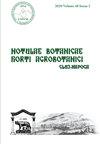Physiological responses of coffee (Coffea arabica L.) plants to biochar application under water deficit conditions
IF 1.3
4区 生物学
Q3 PLANT SCIENCES
引用次数: 0
Abstract
Water deficit is one of the main abiotic stressors in crop production. The development of strategies to improve plant tolerance to water deficits has gained importance. Biochar application can be considered an alternative to mitigate abiotic stress. The use of coffee pulp to produce biochar could be a novel strategy for improving drought tolerance in coffee crops. Coffer plants cv. ‘Castillo’ were grown in pots or PVC pipes filled with silt loam soil in two separate experiments to evaluate the effect of coffee pulp biochar application on physiological responses under water deficit conditions. Four different biochar doses (0, 4, 8, and 16 t · ha-1) were used. A water deficit was imposed through progressive reduction irrigation (25%, 50%, 75%, and 90% of water lost via evapotranspiration). The leaf gas exchange, maximum quantum yield of PSII (Fv/Fm), biomass, and water status were measured. Reduced irrigation negatively affected the Fv/Fm, leaf gas exchange, biomass, and water status. Biochar (8 t ha-1) increased photosynthesis in both well-irrigated plants (6 µmol m-2 s-1) and with reduced irrigation (3.5 µmol m-2 s-1) compared to 0 t ha-1 biochar (reduced irrigation: 1.8 µmol m-2 s-1 and well irrigated: 3.9 µmol m-2 s-1). In conclusion, 8 t ha-1 biochar can be a recommended practice for coffee production, not only to capture carbon and reintroduce it to the soil, but also to alleviate the effects of moderate water deficit. In future investigations, biochar application can be evaluated as an alternative to soil management or coffee plant nutrition, and its interaction with drought stress scenarios.缺水条件下咖啡(Coffea arabica L.)植株对生物炭施用的生理反应
水分亏缺是作物生产中主要的非生物胁迫因素之一。发展提高植物对水分缺乏的耐受性的策略已经变得非常重要。生物炭的应用可以被认为是缓解非生物胁迫的一种替代方法。利用咖啡浆生产生物炭可能是提高咖啡作物耐旱性的一种新策略。保险箱植物cv。在两个不同的试验中,研究了咖啡浆生物炭对缺水条件下咖啡浆生理反应的影响。使用4种不同的生物炭剂量(0、4、8和16 t·ha-1)。通过逐步减少灌溉(25%、50%、75%和90%的水分通过蒸散损失)来施加水分亏缺。测定叶片气体交换、PSII最大量子产率(Fv/Fm)、生物量和水分状况。减少灌溉对Fv/Fm、叶片气体交换、生物量和水分状况有负面影响。与0 t ha-1生物炭(减少灌溉1.8µmol m-2 s-1,良好灌溉3.9µmol m-2 s-1)相比,8 t ha-1生物炭增加了灌溉良好的植物(6µmol m-2 s-1)和减少灌溉(3.5µmol m-2 s-1)的光合作用。综上所述,8 t ha-1生物炭可以作为咖啡生产的推荐做法,不仅可以捕获碳并将其重新引入土壤,而且可以缓解中度水分亏缺的影响。在未来的研究中,生物炭的应用可以评估作为土壤管理或咖啡植物营养的替代方案,以及它与干旱胁迫情景的相互作用。
本文章由计算机程序翻译,如有差异,请以英文原文为准。
求助全文
约1分钟内获得全文
求助全文
来源期刊

Notulae Botanicae Horti Agrobotanici Cluj-napoca
PLANT SCIENCES-
CiteScore
2.70
自引率
0.00%
发文量
118
审稿时长
3 months
期刊介绍:
Notulae Botanicae Horti Agrobotanici Cluj-Napoca is a peer-reviewed biannual journal aimed at disseminating significant research and original papers, critical reviews and short reviews. The subjects refer on plant biodiversity, genetics and plant breeding, development of new methodologies that can be of interest to a wide audience of plant scientists in all areas of plant biology, agriculture, horticulture and forestry. The journal encourages authors to frame their research questions and discuss their results in terms of the major questions of plant sciences, thereby maximizing the impact and value of their research, and thus in favor of spreading their studies outcome. The papers must be of potential interest to a significant number of scientists and, if specific to a local situation, must be relevant to a wide body of knowledge in life sciences. Articles should make a significant contribution to the advancement of knowledge or toward a better understanding of existing biological and agricultural concepts. An international Editorial Board advises the journal. The total content of the journal may be used for educational, non-profit purposes without regard to copyright. The distribution of the material is encouraged with the condition that the authors and the source (Notulae Botanicae Horti Agrobotanici Cluj-Napoca or JCR abbrev. title Not Bot Horti Agrobo) are mentioned.
 求助内容:
求助内容: 应助结果提醒方式:
应助结果提醒方式:


